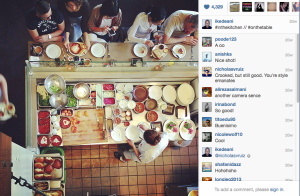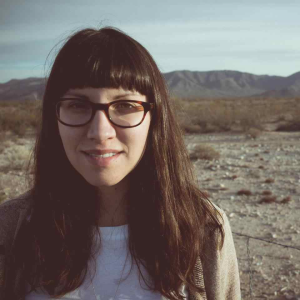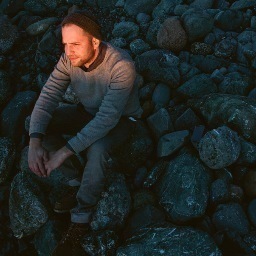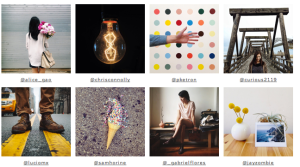Want smarter insights in your inbox? Sign up for our weekly newsletters to get only what matters to enterprise AI, data, and security leaders. Subscribe Now
In 2011, Ike Edeani bought his first iPhone, primarily so he could download a new photo app called Instagram.
At the time, Edeani yearned to quit his day job as a graphic designer to pursue his passion for photography. Instagram offered a creative outlet and a receptive audience, so he quickly got hooked. His carefully-considered subject matter and his focus on composition and light helped endear him to the then-fledgling photo-sharing community.
[Don’t miss our gallery of the top Instagram artists. Check it out here.]

Above: Edeani’s Instagram photos receive thousands of “likes”
Now, more than 360,000 people follow Edeani on Instagram, making him one of the most influential artists on the network.
Those of us with just a few measly “likes” on our #nofilter sunset snaps might wonder: Where do all these followers come from?
Cast your mind back to the early days of Instagram, long before the photo-sharing app inspired a bidding war between social media titans Jack Dorsey and Mark Zuckerberg. In 2011, Instagram was just beginning to gain a foothold in the community.
Even in those early days, Instagram had its die-hard fans. One devotee, Jessica Zollman (@JayZombie) would spend hours tinkering with Instagram while working at another startup. Her dedication impressed the founders, Kevin Systrom and Mike Krieger. In August of that year, she was formally brought on by Instagram as a “Community Evangelist,” making her the startup’s fifth employee.
In her new role, Zollman helped promote the best artists to feature on the “suggested user list,” which is maintained by the community.

Above: Community evangelist @JayZombie
Zollman added Edeani to the list, along with a few dozen others. In a matter of months, Zollman had inadvertently created a pack of pseudo-Internet celebrities.
The Daily Dot reported that Instagram cut down its list of suggested users to follow from around 200 to just 72 last year. In the space of a year, most suggested users will break 100,000 followers.
Today, Edeani is regularly approached by ad agencies and brands willing to pay him hundreds of dollars to photograph their products on Instagram.
He could probably make a decent living through Instagram alone. But he turns down many of these paid opportunities, because he doesn’t want to lose credibility with his followers by turning his Instagram presence into a platform for promotional photos. Instead, he primarily uses the service as a tool to promote his fledgling photography business.
“I owe Instagram a lot. And have received so many emails and offers of photography work,” he told me.
The most powerful marketing tool for brands?
Brands are also staking their claim on Instagram, which offers an alternative to traditional advertising. In addition to creating brand-specific accounts, corporate social media teams are busy discovering and cultivating relationships with “super users” like Edeani.
But it’s still early days for Instagram marketing, which means companies are trying many different approaches.

Above: Edeani took over Warby Parker’s corporate account and snapped a self-portrait
Nike, PayPal, and Starbucks were among the first companies to realize the business value of Instagram and have set up accounts that now have more than a million followers.
They hire Edeani and other Instagram artists to take these accounts over for a day or two. Edeani will mention on his personal account that he’s representing Warby Parker or some other brand.
The artists are often encouraged by social media teams to develop story lines inspired by their new products. It’s far more compelling for consumers than an endless stream of retro-filtered coffee cups or running shoes.
Freelance art director Michael O’Neal, better known as @MoNeal, recalls a time when top Instagrammers (himself included) would get their wrists slapped by Instagram if they worked too closely with brands. Littering personal accounts with logos was something Instagram just didn’t condone.
But lately, Instagram’s team has been more receptive to product placements, advertising, and partnerships, even encouraging its top users to do brand marketing. This shift started after Facebook’s $1.2 billion acquisition, and after CEO Kevin Systrom’s subsequent experiments with new revenue models.
These days, O’Neal says, it’s almost a badge of honor for Instagram artists to be selected by a brand or agency for a corporate campaign.
Meet the “Instagram ambassador”

Above: Instagram evangelist Michael O’Neal
O’Neal also discovered Instagram in its early days, shortly after he moved from New York to San Francisco. New to the city, he would spend his weekends exploring, using the app as a visual diary of sorts. He’d find local gems, photograph them, and share them with his network.
Fortunately for O’Neal, his circle included Zollman, who selected him for Instagram’s coveted suggested user list. His follower base subsequently ballooned to over 500,000 people.
In a matter of months, he began receiving regular emails from tourists in San Francisco. They would get to know the city by following his Instagram photos, which formed a sort of social-media trail of crumbs through the city. O’Neal began organizing “Instameets” for his followers in the area and also set up educational “photo walks.”
Brands began to approach him, too. O’Neal told me that media powerhouses like CNN would ask for advice about leveraging the social network (“Instagram 101”), and others would offer him paid gigs.
“This app has changed my life,” he said in a phone interview from Apple‘s Sunnyvale headquarters, where he’s working for the summer on the creative team.
O’Neal is genuinely passionate about Instagram, which he believes is a democratizing influence in the art world.
“The best camera is the one that you carry in your pocket,” he explained, repeating a popular photographic cliché. “I just fell in love with the idea that Instagram levels the playing field, and became an ambassador for the company.”
Similarly to Edeani, who is a good friend of his, O’Neal rejects most of the corporate social media teams who approach him — most won’t pay more than a few hundred dollars. “I haven’t been ready to pollute my personal photos with commercial endorsements,” he said.
According to O’Neal, most marketing departments still haven’t set aside ample budgets for the new crop of social media sites, like Instagram and Pinterest.
But mobile photographers (O’Neal’s preferred term) are proving more willing to work with brands that pay a decent freelance wage, or sweeten the deal with cool perks.
O’Neal just returned from an all-expenses paid trip to Hawaii, where he participated in a five-mile run. During that time, he snapped Instagram photos and added hashtags to promote Nike products. He stresses that he wasn’t under contract to share any specific number of photos and was given a fair bit of creative license.
The relationship between artists and brands

Above: Instagram artists selected for the new agency, Tinker Mobile
One thing is clear from conversations with Edeani and O’Neal: Brands are figuring out what works.
Edeani hints at a gulf between brands and Instagrammers; both believe they have a better idea of how to reach audiences.
The problem is that many of the top Instagrammers consider themselves artists (most are professional photographers or have received some training) and will develop etiquette or a set of guidelines that they clearly communicate to followers. It’s not dissimilar to the editorial ethics statements on many of the leading online news publications.
Edeani has worked with Warby Parker and Samsung, companies that give him a free rein. He will make clear to his followers when he’s working with one of these brands and will refuse companies if he’s not already a fan of their products.
“I know my audience better than they [brands] do,” Edeani told me. “I work with products or brands I already use and integrate them into my daily life.”
O’Neal believes that partnerships between Instagrammers and brands will become increasingly common. For now, he fears these relationships are not always based on mutual understanding and respect.
This gave him the idea for a business to connect popular Instagrammers with paid opportunities.
His startup, dubbed Tinker Mobile, is launching in the coming months. It’s a talent agency of sorts — O’Neal and his cofounder Jesse Miller will negotiate on behalf of Instagram artists to ensure they get a fair wage. He won’t disclose specifics yet, but compensation will be far more than the usual few hundred dollars for a day’s work.
O’Neal is working with New York-based ad agency Razorfish for the “Take the Wheel” campaign, which is sponsored by Mercedes. Five top Instagrammers — O’Neal included — will take off on a road trip in a brand new Mercedes Benz CLA for five days.
The Instagrammers are paid to post Instagram photos during their journey. Whoever gets the most “likes” will win the car. Check out the promo below.
[youtube=http://www.youtube.com/watch?v=BYQL6-3Q8LI&w=560&h=315]
O’Neal has been highly selective about the first batch of talented Instagrammers that he’ll represent, perhaps even more so than a Hollywood talent agency.
The artists that made the cut typically boast over half a million followers, and most are based in the United States. O’Neal calls them his “photography collective” and claims they are all open to working with brands in an “authentic way.” [Check out a sample of their artwork in our gallery here.]
O’Neal even recruited Zollman — she left Facebook recently to pursue her passion for photography full-time.
The business of partnerships

Above: A portrait of Baldwin Cunningham taken by close friend Ike Edeani
O’Neal isn’t the only entrepreneur who believes Instagram is at a pivotal moment in its growth.
For smart operators like Baldwin Cunningham, the real money-making opportunity is in partnerships.
Cunningham is aware that Instagram’s niche is hipster types living in big cities. Brands want to tap into the most influential and creative among them as ambassadors, and that’s where Cunningham’s startup Partnered steps in.
Partnered (a Y Combinator graduate previously known as “Sponsorfied“) will take a cut for facilitating a deal between a brand and social media influencer.
A handful of Instagrammers are already making “thousands of dollars on each partnership,” he told me, “enough to make a living.”
On Partnered, Cunningham is featuring one such campaign, “Phoot Camp.” Partnered will select 30 top Instagrammers for a photo workshop at a weekend retreat. Over a long weekend, they will be presented with opportunities to work with brands.
These brands weren’t difficult to recruit. “Trust me, Instagram is a channel that brands want to use to get to target audiences,” he said.
Instagram: a powerful tool for small businesses

Above: Florist Amy Merrick promotes her business on Instagram
It’s not just mobile photographers who are making a living on Instagram — small business owners view it as the optimal sales and marketing channel.
In New York, Instagrammer Amy Merrick has generated a frenzy over her flowers.
Most of her paying customers follow her on Instagram; her personal account boasts 49,000 fans. It’s all organic growth, as Merrick hasn’t been placed on a suggested user list.
Merrick would be lucky if 49 people stopped by her Brooklyn-based flower shop on a wintry weekday.
It’s understandable that she’s gained a following, particularly among young, urban women. Merrick’s Instagram photos are compositionally stunning, equal parts modern Brooklyn and Victorian England. They harken back to another time when ladies wore chic hats and received roses from suitors “just because.”
This kind of creative vision and personal touch is what sets Merrick apart from thousands of franchises. It has led to styling gigs for magazines and blogs and has been a major boost in visibility for her business.
Likewise, Anne Vickman, a social media manager for Boston-based Belmont’s Craft Beer Cellar, has experienced a surge in sales since she began posting snaps of her highly-coveted brews on Instagram.
Vickman told me Instagram has been the ideal marketing medium; customers have noticed a photo (often tagged with frequently-trending #beerporn), and reached out to her directly to order shipments.
“I started using it for the store [in February] because I know that craft beer geeks far and wide are very active on social media, and Instagram is no exception,” she said.
Merrick and Vickman are part of a new generation of small business owners who use the social networking tool to market their businesses, and themselves.
“Instagram is a visual ‘day in the life’ where you can show off your sales and process.” O’Neal explained. “It’s truly the best avenue to get your photos out there and share with the world.”
[For more Instagram photos, check out the gallery of Tinker Mobile’s artists here.]


